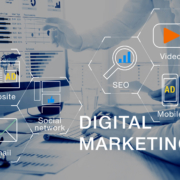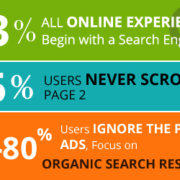Your Guide to Marketing KPIs
SEO, CTA, KPI … The list of terms you need to know for your marketing strategy seems to go on and on. We’re here to help break it down and make it easy for you to understand. Keep reading for our full guide to marketing key performance indicators (KPIs).
What is a KPI?
KPI stands for key performance indicator. They are a way to measure performance over time. Following certain metrics over time can help your business reach milestones, gauge processes, and provide insight to make better business decisions.
What Marketing KPIs Should You Track?
Tracking the right key performance indicators can provide a holistic view of how your business is performing.
We, like Semrush, believe that these are some of the best KPIs you should be tracking:
- Conversions: How many of your site visitors are qualified leads? How many of them convert to closed sales?
- ROI: Return on investment is a metric that tells you how profitable an investment is/was, in this case, likely how profitable your marketing investment was.
- Organic Visibility: How are people finding your site? Are you showing up through organic search?
- Organic Sessions: How many users are finding your site through an organic search?
- Bounce Rate: How quickly are users leaving your site after visiting? If your site is not user-friendly, loads slowly, or doesn’t provide the information your users are looking for, they might exit the site after viewing only a single page.
- Average Time on Page: How long are your users spending on your site pages? Pages with more content, such as blogs or videos, typically tend to drive longer time on-page.
- Organic CTR (click-through rate): Does your site have clear calls to action (CTAs)? How often are users clicking buttons or links on your site? Which buttons/links are you driving them to click?
- Backlinks: Sites with higher authority are more likely to see increased backlinks. If your site provides valuable, authoritative information that users find helpful, and useful, they may be more likely to link to it from their own sites. This helps drive referral traffic to your site and continues to support authority improvements.
- Keyword rankings: Keyword rankings are the primary driver of organic search traffic. Targeting specific keywords relevant to what your business does is critical to increasing organic search traffic. It’s important to track keywords in two ways: total ranking keywords, and keyword ranking positions.
- Branded vs. Non-Branded Traffic: Branded keywords are directly related to your unique business. For our brand, this would include keywords such as “Digital Storyteller,” “Digital Storyteller marketing agency,” “Andrew Marr,” etc. Non-branded keywords are those that your site ranks for that are not specific to you, such as “digital marketing,” “social media management,” and “search engine optimization.”
- Page Speed: Page speed is a huge determinant of how your site performs. According to backlinko, the average page loading speed is 10.3 seconds on desktop and 27.3 seconds on mobile. If your site takes longer than this to load, chances are your user won’t wait and will instead visit a competitor’s site instead. Safe to say we’ve become a pretty impatient society …
- Coverage Issues: Performing site audits can ensure that your site is functioning properly and that Google is indexing and reading your site as it should be. Google Search Console is a critical tool in identifying coverage issues and can help you solve any issues that you find.
How to Develop your Marketing KPI Strategy
Your business’ marketing KPI strategy should be unique to your business needs. Sure, you can glean ideas from other similar business models, but tailor yours to help guide you where you want to go.
Here are a few tips on how to develop your marketing KPI strategy.
- Define your KPIs- Which specific KPIs will your business track? How will you collect the data and how often will you track shifts?
- Use the SMART Method- KPIs should be Specific, Measurable, Attainable, Realistic, and Time-Bound. For example, “Onboard 7 new clients in the next 12 months.”
- Keep your KPIs clear- Your team should understand your KPIs and how to act on them to make decisions that ultimately lead to reaching your goals.
- Revisit your plan- Sometimes plans need to change. Revisit your KPI strategy to make sure the strategy is still working for you. Maybe you need to adjust a few action items based to keep propelling forward in the right direction.
- Don’t overdo it with KPIs- Try to avoid doing too much, too quickly. With access to a plethora of data, it can be easy to try to measure every little thing. We recommend using the information to stay on track with your most important targets- however you define them. This will help you avoid KPI overload.
See an example below of how we at Digital Storyteller keep track of the important KPIs to our business strategy.











